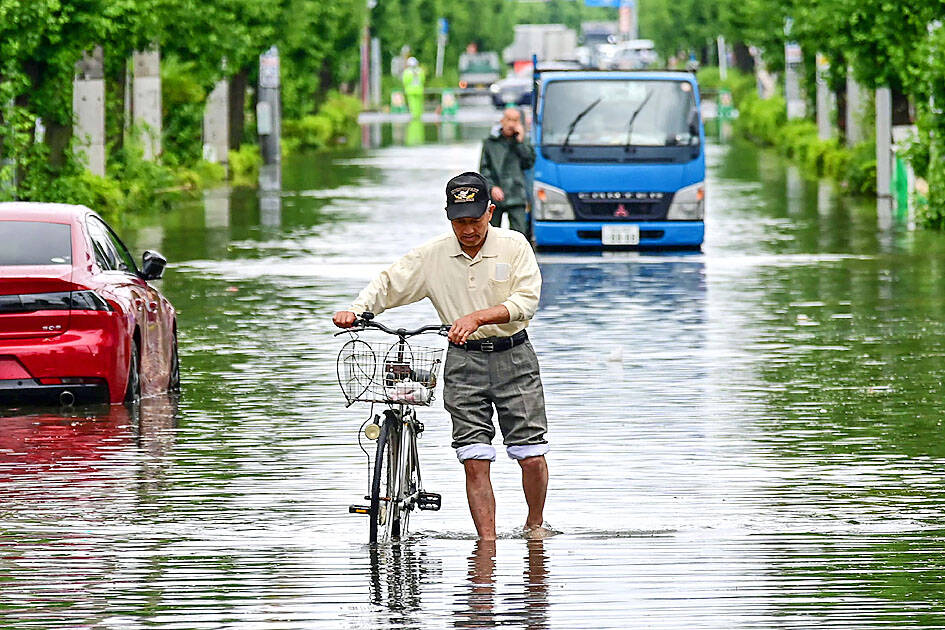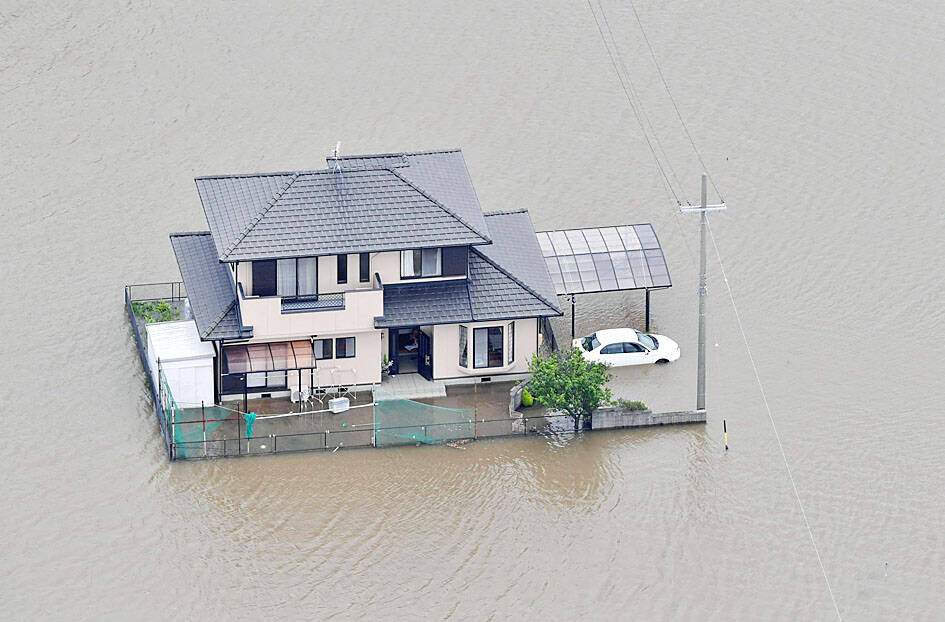Heavy rain across parts of Japan has killed one person, left two missing and injured dozens more, authorities said yesterday, with thousands of residents issued evacuation warnings.
The inundation has been caused by the remnants of former Typhoon Mawar, which was downgraded to a tropical storm.
A rescue team in central Aichi Prefecture’s Toyohashi city, where the country’s highest-level evacuation alert was issued on Friday, “found a man approximately in his 60s in a submerged car, but he was later confirmed dead,” a city official said.

Photo: AFP
In western Wakayama Prefecture, where several rivers burst their banks, officials said that they had resumed the search for one man and one woman missing in the region.
A total of six people were seriously injured and 24 suffered minor injuries as of yesterday morning, the Japanese Fire and Disaster Management Agency said.
In central and western Japan, many evacuation orders — which are non-compulsory, even at the highest level — were being downgraded as rains eased.

Photo: Reuters
However, new warnings were issued in areas close to Tokyo in early yesterday morning due to flooding risks.
With several cities including Toyohashi and Koshigaya near Tokyo reportedly seeing the highest 24-hour rainfall on record, the Japan Meteorological Agency urged residents to “be on high alert for landslides, overflowing rivers and flooding of low-lying areas.”
About 4,000 households in regions close to Tokyo experienced power outages early yesterday, Tokyo Electric Power Co said, adding that the issue was mostly resolved several hours later.
Shinkansen bullet trains were temporarily suspended between Tokyo and Nagoya, but Japan Railways Group said they resumed operations at about noon.
Scientists have said climate change is intensifying the risk of heavy rain in Japan and elsewhere, as a warmer atmosphere holds more water.
Strong rain in 2021 triggered a devastating landslide in the central resort town of Atami, killing 27 people.
In 2018, floods and landslides killed more than 200 people in western Japan during the country’s annual rainy season.

Seven people sustained mostly minor injuries in an airplane fire in South Korea, authorities said yesterday, with local media suggesting the blaze might have been caused by a portable battery stored in the overhead bin. The Air Busan plane, an Airbus A321, was set to fly to Hong Kong from Gimhae International Airport in southeastern Busan, but caught fire in the rear section on Tuesday night, the South Korean Ministry of Land, Infrastructure and Transport said. A total of 169 passengers and seven flight attendants and staff were evacuated down inflatable slides, it said. Authorities initially reported three injuries, but revised the number

‘BALD-FACED LIE’: The woman is accused of administering non-prescribed drugs to the one-year-old and filmed the toddler’s distress to solicit donations online A social media influencer accused of filming the torture of her baby to gain money allegedly manufactured symptoms causing the toddler to have brain surgery, a magistrate has heard. The 34-year-old Queensland woman is charged with torturing an infant and posting videos of the little girl online to build a social media following and solicit donations. A decision on her bail application in a Brisbane court was yesterday postponed after the magistrate opted to take more time before making a decision in an effort “not to be overwhelmed” by the nature of allegations “so offensive to right-thinking people.” The Sunshine Coast woman —

BORDER SERVICES: With the US-funded International Rescue Committee telling clinics to shut by tomorrow, Burmese refugees face sudden discharge from Thai hospitals Healthcare centers serving tens of thousands of refugees on the Thai-Myanmar border have been ordered shut after US President Donald Trump froze most foreign aid last week, forcing Thai officials to transport the sickest patients to other facilities. The International Rescue Committee (IRC), which funds the clinics with US support, told the facilities to shut by tomorrow, a local official and two camp committee members said. The IRC did not respond to a request for comment. Trump last week paused development assistance from the US Agency for International Development for 90 days to assess compatibility with his “America First” policy. The freeze has thrown
TESTING BAN: Satellite photos show a facility in the Chinese city of Mianyang that could aid nuclear weapons design and power generation, a US researcher said China appears to be building a large laser-ignited fusion research center in the southwestern city of Mianyang, experts at two analytical organizations said, a development that could aid nuclear weapons design and work exploring power generation. Satellite photos show four outlying “arms” that would house laser bays, and a central experiment bay that would hold a target chamber containing hydrogen isotopes the powerful lasers would fuse together, producing energy, said Decker Eveleth, a researcher at US-based independent research organization CNA Corp. It is a similar layout to the US$3.5 billion US National Ignition Facility (NIF) in northern California, which in 2022 generated